#Philosophy and the Mirror of Nature
Quote
Before Kant, an inquiry into "the nature and origin of knowledge" had been a search for privileged inner representations. With Kant, it became a search for the rules which the mind had set up for itself (the "Principles of the Pure Understanding"). This is one of the reasons why Kant was thought to have led us from nature to freedom. Instead of seeing ourselves as quasi-Newtonian machines, hoping to be compelled by the right inner entities and thus to function according to nature's design for us, Kant let us see ourselves as deciding (noumenally, and hence unconsciously) what nature was to be allowed to be like. Kant did not, however, free us from Locke's confusion between justification and causal explanation, the basic confusion contained in the idea of a "theory of knowledge."
Richard Rorty, Philosophy and the Mirror of Nature
#philosophy#quotes#Richard Rorty#Philosophy and the Mirror of Nature#Kant#belief#representation#justification#causality#knowledge#epistemology
81 notes
·
View notes
Text
"We are talking about a very evil force here!"
"Archchancellor, I see evil when I look in my shaving mirror. It is, philosophically, present everywhere in the universe in order, apparently, to highlight the existence of good. I think there is more to this theory, but I tend to burst out laughing at this point."
Terry Pratchett, Unseen Academicals
#the dean#havelock vetinari#unseen academicals#discworld#terry pratchett#good#evil#good vs evil#philosophy#human nature#universe#punchline#self awareness#i see evil in the mirror#more to this theory
140 notes
·
View notes
Text
Different podcast, I do enjoy recapping the balls to the wall bonkers plot of Kingdom Hearts but I really need the recappers to understand that sometimes, especially in the side games, these aren't characters, they're mouthpieces for philosophic viewpoints in answer to a shared question, with the protagonist's primary role being to try the solutions offered and figure out what works best for them.
You know, like every other Square Enix game with rare to zero exceptions
#basically the kingdom hearts series imo is about the nature of man/what makes a person different from an animal#chain of memories asks if memories make the nature of a person and seems to lean yes for most of the game before swerving right at the end#of sora's route; riku's route is a much stabler path but between the two the conclusion very much seems to be 'yes theyre important but you#can surpass them'#birth by sleep is more or less about destiny and its got some fun twists on the way to its conclusion but iirc id say its saying destiny is#is the antithesis of identity#i havent played coded but its very clearly about relationships -- i think all of the phone games are?#anyway coded rather clearly says relationships are very close to being what makes us us because they are mirrors of the soul/the connection#s between souls#days i also havent played but the akuroku fandom osmosis is so real#currently my thought is that days is an exploration of the ship of Theseus phenomenon#and/or the conclusion the other side games are coming to#which makes no sense because kh3 exists but i still have the other ~half of the games to work into this frame work#the side games have MUCH more room for the philosophy shit than the main games; i think thats part of why there's so many#more fun for nomura
3 notes
·
View notes
Text
#zombies 3#disney zombies#cinemetography#tico herrera#ma boi paul hoen linked this on insta#it's a product-review-as-article#so grain of salt the commercial nature of the piece#but i did get misty-eyed reading about the creative philosophies of the behind the camera work#that mirror the on camera philosophies#also also I'm still on my journey of being able to distinguish and correctly attribute work done by the DP vice the director
3 notes
·
View notes
Text
The Ultimate Grimoire Guide
So! I have been seeing a ton of grimoire ideas and thought I’d stuff them all together. A lot of ideas are from @manifestationsofasort, @banebite, and @pigeonflavouredcake. Check them out! They have a ton of cool stuff there.
What Do I Use For My Grimoire?
You can use anything for a grimoire! For a physical one, journals, binders, and notebooks are good. For digital ones, Notion, Tumblr, Docs, and even just your file folder are great.
Introduction
A Book Blessing
Table of Contents
About Me
Your Current Path
Your Personal Beliefs
Your Spiritual Journey
Superstitions
Past lives
Favorite Herbs/Crystals/Animals/Etc.
Natal Chart
Craft Name
How You Entered The Craft
Astrology Signs
Birthday Correspondences (birth tarot card, birth stone, etc.)
Goals
Safety
Fire Safety
What Not to Burn
Toxic Plants & Oils (to humans, plants, animals)
Crystals That Shouldn’t Be Put… (in sun, in water, etc.)
Things That Shouldn’t Be In Nature (glass, salt, etc.)
Potion Safety
How to Incorporate Blood in Spells
Smoke Safety
Wound Care
Biohazards
Core Concepts
Intention & How It Works
Directing Energy
Protection
Banishing
Cleansing
Binding
Charging
Shielding
Grounding
Centering
Visualization
Consecration/Blessing
Warding
Enchanting
Manifestation
Meditation
What Makes A Spell Work
Basic Spell Structure
What Not To Do In Spells
Disposing Spell Ingredients
Revitalizing Long Term Spells
How To Cast Spells
What To Put In Spells
Spell Mediums (jars, spoken, candle, sigils)
Spell Timing
Potion Bases
Differentiating Between Magick and Mundane
Common Terms
Common Symbols
Intuition
Elements
Basic Alchemy and Symbols
Ways To Break Spells
Laws and Philosophies
Correspondences
Herbs & Spices
Crystals & Rocks
Colors
Liquids & Drinks
Metals
Numbers
Tarot Cards
Elements
Trees & Woods
Flowers
Days
Months
Seasons
Moon Phases
Zodiacs
Planets
Incense
Teas
Essential Oils
Directions
Animals
Symbology
Bone Correspondences
Different Types of Water
Common Plants
Entities
Deities You Worship
Pantheons
Pantheons & Deities Closed to You
Common Offerings
Epithets
Mythos
Family
Worship vs Work
Prayers & Prayer Template
Altars
Deity Comms
Devotional Acts
Angels
Demons
Ancestors
Spirit Guides
Fae
Familiars
House, Animal, Plant, Etc. Spirits
Folklore Entities
Spirit Etiquette
Graveyard Etiquette
Boundaries
Communication Guide & Etiquette
Spirit Work Safety Guide
How Entities Appear To You
Circle Casting
Common Offerings
Altars
Servitors
Mythological Creatures (dragons, gorgons, etc.)
Utility Pages
Gazing Pages
Sigil Charging Station
Altar Pages
Intent Pages
Getaway Pages
Vision Boards
Dream Pages
Binding Page
Pendulum Board
Crystal Grid
Throwing Bones Page
Divination Pages
Mirror Gazing Page
Invocation Pages
Affirmation/Manifestation Pages
Spirit Board Page
Other Practices
Practices That Are Closed to You (Voodoo, Hoodoo, Santeria, Brujeria, Shamanism, Native Practices)
Wicca and Wiccan Paths
Satanism, Both Theistic and Non-Theistic
Deity Work
Religious Paths (Hellenism, Christianity, Kemeticism, etc.)
Animism
Types of Magic/Spells
Pop Culture Paganism/Magic
Tech Magic
Chaos Magic
Green Magic
Lunar Magic
Solar Magic
Sea Magic
Kitchen Magic
Ceremonial Magic
Hedge Magic
Death Magic
Gray Magic
Eclectic Magic
Elemental Magic
Fae Magic
Spirit Magic
Candle Magic
Crystal Magic
Herbalism
Glamours
Hexes
Jinxes
Curses
Weather Magic
Astral Magic
Shadow Work
Energy Work
Sigils
Art Magic
Knot Magic
Music Magic
Blood Magic
Bath Magic
Affirmations
Divination
Tarot Cards
Oracle Cards
Playing Cards
Card Spreads
Pendulum
Numerology
Scrying
Palmistry
Tasseography
Runes
Shufflemancy
Dice
Bibliomancy
Carromancy
Pyromancy
Psychic Abilities
Astrology
Auras
Lenormand
Sacred Geometry
Angel Numbers
Ornithomancy
Aeromancy
Aleuromancy
Axinomancy
Belomancy
Hydromancy
Lecanomancy
Necromancy
Oneiromancy
Onomancy
Oomancy
Phyllomancy
Psephomancy
Rhabdomancy
Xylomancy
Tools
Crystal grid
Candle grid
Charms
Talismans
Amulets
Taglocks
Wand
Broom
Athame
Boline
Cingulum
Stang
Bells
Drums
Staffs
Chalices
Cauldrons
Witches Ladder
Poppets
Holidays
Yule
Imbolc
Ostara
Beltane
Litha
Lammas
Mabon
Samhain
Esbats
Deity Specific Holidays
Religious Holidays (Christmas, Easter, Dionysia, etc.)
Celestial Events
Altars
Basics of Altars
Travel Altars
Deity Altars
Spirit Altars
Familiar Altars
Ancestor Altars
Self Altars
Working Altars
Self-Care
Burnout Prevention
Aromatherapy
Stress Management
Coping Mechanisms
Theories & History
Witchcraft history
Paganism
New Age Spirituality
Cultural Appropriation
Thelema
Conspiracy Theories
Cults
Satanic Panic
KJV
Witches in History
Cats in History
Transphobia in Witchcraft Circles
Queerness in Witchcraft Circles
Other
Recipes
How to Get Herbs
Foraging
Drying Herbs and Flowers
Chakras
Reiki
Witches Alphabet
Runic Alphabet
Guide to Gardening
Your Witch Tips
Resources
Other Tips
List of Spells
Cryptids and Their Lore
What is a Liminal Space?
#witch#witchblr#baby witch#witchcraft#witches#kitchen witch#witchcore#witch aesthetic#witchery#witches of tumblr#spoonie witch#beginner witch#witch community#moon witch#green witch#pagan witch#witchy#grimoire#bos#book of shadows#grimoire ideas#book of shadows ideas#bos ideas
5K notes
·
View notes
Text
South Asian and Hindu Influences in ATLA (Part 2)
disclaimer: i was raised culturally and religiously hindu, and though i've tried to do my research for this post and pair it with my own cultural knowledge, i'm not an expert on hinduism by any means. should i mess up, please let me know.
please also be aware that many of the concepts discussed in this post overlap heavily with religions such as buddhism and jainism, which might have different interpretations and representations. as i'm not from those religions or cultures, i don't want to speak on them, but if anyone with that knowledge wishes to add on, please feel free.
Part 1
In the previous post, I discussed some of the things ATLA got right in its depictions of desi and hindu cultures. unfortunately, they also got plenty of things wrong - often in ways that leaned towards racist caricatures - so let's break them down, starting with...
Guru Pathik
both the word "guru" and name "pathik" come from sanskrit. pathik means "traveler" or "he who knows the way" while guru is a term for a guide or mentor, similar to a teacher.
gurus were responsible for the very first education systems in ancient india, setting up institutions called gurukuls. students, referred to as disciples, would often spend years living with and learning from their gurus in these gurukuls, studying vedic and buddhist texts, philosophy, music and even martial arts.
however, their learning was not limited merely to academic study, as gurus were also responsible for guiding the spiritual evolution of their disciples. it was common for disciples to meditate, practice yoga, fast for days or weeks, and complete mundane household chores every day in order to instill them with self-discipline and help them achieve enlightenment and spiritual awareness. the relationship between a guru and his disciple was considered a sacred, holy bond, far exceeding that of a mere teacher and student.
aang's training with guru pathik mirrors some of these elements. similar to real gurus, pathik takes on the role of aang's spiritual mentor. he guides aang in unblocking his chakras and mastering the avatar state through meditation, fasting, and self-reflection - all of which are practices that would have likely been encouraged in disciples by their gurus.
pathik's design also takes inspiration from sadhus, holy men who renounced their worldly ties to follow a path of spiritual discipline. the guru's simple, nondescript clothing and hair are reflective of the ascetic lifestyle sadhus are expected to lead, giving up material belongings and desires in order to achieve spiritual enlightenment and, ultimately, liberation from the reincarnation cycle.
unfortunately, this is where the respectful references end because everything else about guru pathik was insensitive at best and stereotypical at worst.
it is extremely distasteful that the guru speaks with an overexaggerated indian accent, even though the iranian-indian actor who plays him has a naturally british accent. why not just hire an actual indian voice actor if the intention was to make pathik sound authentic? besides, i doubt authenticity was the sole intention, given that the purposeful distortion of indian accents was a common racist trope played for comedy in early 2000s children's media (see: phineas and ferb, diary of a wimpy kid, jessie... the list goes on).
furthermore, while pathik is presented a wise and respected figure within this episode, his next (and last) appearance in the show is entirely the opposite.
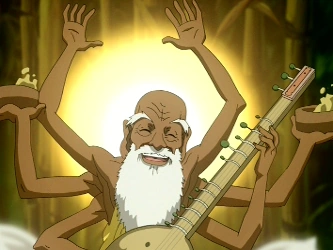
in the episode nightmares and daydreams, pathik appears in aang's nightmare with six hands, holding what appears to be a veena (a classical indian music instrument). this references the iconography of the hindu deity Saraswati, the goddess of wisdom and knowledge. the embodiment of divine enlightenment, learning, insight and truth, Saraswati is a member of the Tridevi (the female version of the Trimurti), one of the most respected and revered goddesses in the Hindu pantheon... and her likeness is used for a cheap laugh on a character who's already treated as a caricature.
that's bad enough on its own, but when you consider that guru pathik is the only explicitly south asian coded character in the entire show, it's downright insulting. for a show that took so many of its foundational concepts from south asia and hinduism and yet provided almost no desi representation in return, this is just rubbing salt in the wound.
Chakras
"chakra", meaning "circle" or "wheel of life" in sanskrit, refers to sources of energy found in the human body. chakra points are aligned along the spine, with energy flowing from the lowest to the highest point. the energy pooled at the lowest chakra is called kundalini, and the aim is to release this energy to the highest chakra in order to achieve spiritual enlightenment and consciousness.
the number of chakras varies in different religions, with buddhism referencing five chakras while hinduism has seven. atla draws from the latter influence, so let's take a look at the seven chakras:
Muladhara (the Root Chakra). located at the base of the spine, this chakra deals with our basest instincts and is linked to the element of earth.
Swadhisthana (the Sacral Chakra). located just below the navel, this chakra deals with emotional intensity and pleasure and is linked to the element of water.
Manipura (the Solar Plexus Chakra). located in the stomach, this chakra deals with willpower and self-acceptance and is linked to the element of fire.
Anahata (the Heart Chakra). located in the heart, this chakra deals with love, compassion and forgiveness and is linked to the element of air. in the show, this chakra is blocked by aang's grief over the loss of the air nomads, which is a nice elemental allusion.
Vishudda (the Throat Chakra). located at the base of the throat, this chakra deals with communication and honesty and is linked to the fifth classical element of space. the show calls this the Sound Chakra, though i'm unsure where they got that from.
Ajna (the Third Eye Chakra). located in the centre of the forehead, this chakra deals with spirituality and insight and is also linked to the element of space. the show calls it the Light Chakra, which is fairly close.
Sahasrara (the Crown Chakra). located at the very top of the head, this chakra deals with pure cosmic consciousness and is also linked to the element of space. it makes perfect sense that this would be the final chakra aang has to unblock in order to connect with the avatar spirit, since the crown chakra is meant to be the point of communion with one's deepest, truest self.
the show follows these associations and descriptions almost verbatim, and does a good job linking the individual chakras to their associated struggles in aang's arc.
Cosmic Energy
the idea of chakras is associated with the concept of shakti, which refers to the life-giving energy that flows throughout the universe and within every individual.
the idea of shakti is a fundamentally unifying one, stating that all living beings are connected to one another and the universe through the cosmic energy that flows through us all. this philosophy is referenced both in the swamp episode and in guru pathik telling aang that the greatest illusion in the world is that of separation - after all, how can there be any real separation when every life is sustained by the same force?
this is also why aang needing to let go of katara did not, as he mistakenly assumed, mean he had to stop loving her. rather, the point of shedding earthly attachment is to allow one to become more attuned to shakti, both within oneself and others. ironically, in letting go of katara and allowing himself to commune with the divine energy of the universe instead, aang would have been more connected to her - not less.
The Avatar State
according to hinduism, there are five classical elements known as pancha bhuta that form the foundations of all creation: air, water, earth, fire, and space/atmosphere.
obviously, atla borrows this concept in making a world entirely based on the four classical elements. but looking at how the avatar spirit is portrayed as a giant version of aang suspended in mid-air, far above the earth, it's possible that this could reference the fifth liminal element of space as well.
admittedly this might be a bit of a reach, but personally i find it a neat piece of worldbuilding that could further explain the power of the avatar. compared to anyone else who might be able to master only one element, mastering all five means having control of every building block of the world. this would allow the avatar to be far more attuned to the spiritual energy within the universe - and themselves - as a result, setting in motion the endless cycle of death and rebirth that would connect their soul even across lifetimes.
#atla#atla cultural influences#hinduism in atla#welp i thought this would be the last part but i ended up having more to talk about than i thought#so i'll save the book 3 inspirations for the next post#including my absolute favourite combustion man#and by favourite i mean kill it with fire why did you ever think this was okay to do writers
433 notes
·
View notes
Note
Create another valyrian household that escaped Valyria. They hid themselves away by magic on an island not visible to anyone, they don't wish to be seen. On an island with a huge fortress accompanied with another smaller fortress which is basically a library. They are similar to Targaryens, but much more knowledgeable on everything (thanks to Valyria). They ride dragons, purple shades of eyes, silver-gold hair. Only two differences being, they have never been married outside of family(yuck) with no Westerosi blood therefore very different customs, fully valyrian customs and traditions rather than Westerosi+valyrian(Targs, Vels). Hope you have fun, thank you:)

𓈒ㅤׂㅤ 𓇼 ࣪ 𝐇𝐎𝐔𝐒𝐄 𝐋𝐘𝐑𝐈𝐄𝐋𝐋𝐄 𓈒ㅤׂㅤ⭒⠀
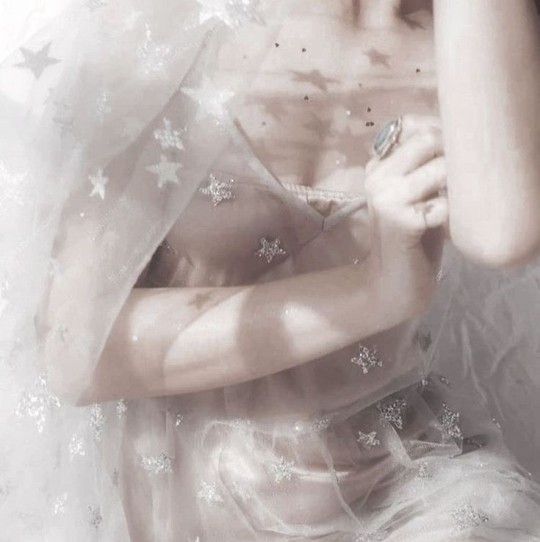
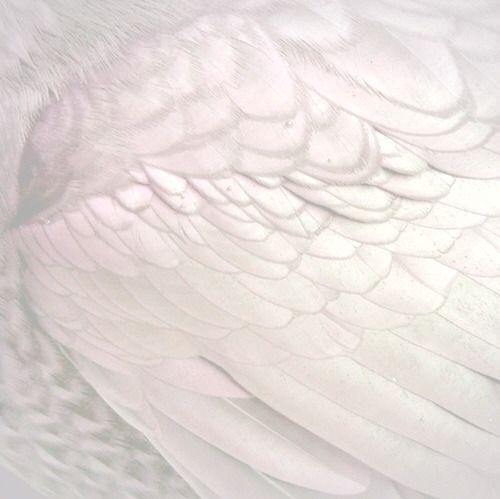
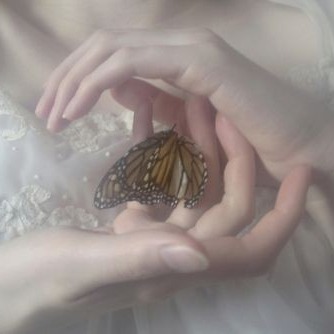
꒰͡ ⠀ ִ 𝐺𝐸𝑁𝑇𝐿𝐸 𝐴𝑁𝐷 𝐿𝑂𝑉𝐼𝑁𝐺 ⠀ׂ ⠀ ͡꒱
─ 𝘈 𝘤𝘳𝘦𝘢𝘵𝘶𝘳𝘦 𝘰𝘧 𝘮𝘢𝘨𝘪𝘤, 𝘨𝘳𝘢𝘤𝘦, 𝘢𝘯𝘥 𝘭𝘪𝘨𝘩𝘵 𖤐
─ 𝘈 𝘣𝘦𝘪𝘯𝘨 𝘰𝘧 𝘱𝘶𝘳𝘪𝘵𝘺, 𝘢 𝘸𝘰𝘯𝘥𝘳𝘰𝘶𝘴 𝘴𝘪𝘨𝘩𝘵 𖤐

In the rich tapestry of Valyrian history, woven with the threads of power, magic, and dragonfire, the House Lyrielle stands as a testament to the enduring grace and wisdom of Old Valyria. Their story is a whisper on the wind, a secret melody sung by the waves that surround their hidden island sanctuary. Known to but a few, the Lyrielles are the guardians of a legacy untainted by the ambition and corruption that led to the Doom.
The sigil of House Lyrielle is as enigmatic as the house itself—an angelic dragon, graceful and serene, enwreathed in a ring of white roses against a backdrop of deepest emerald. The dragon, smaller in stature but fierce in its intelligence and agility, represents the nature of the Lyrielles' own dragons. The emerald ground symbolizes their secluded island, a jewel hidden in the vast sea, and the white roses signify the purity of their intentions and the mystical barriers that veil their home from the unwary eye.
Their words, "Beyond Sight, Within Light," speak to the heart of the House Lyrielle ethos. They live beyond the sight of the known world, in a realm of their own making, where knowledge and virtue shine brighter than any Valyrian steel. These words are a promise of their commitment to the greater good, a reminder of their hidden presence guiding the fate of the world from the shadows.
The Lyrielles, in their seclusion, have preserved the purity of their Valyrian bloodline, untouched by Westerosi influence. Their customs and traditions remain a living tapestry of Old Valyria's glory, a culture preserved in amber amidst the tumultuous seas of change.
Education and learning are held in the highest regard. The smaller fortress, known as the Lyceum of Light, houses a vast collection of scrolls and tomes, not only on magic and dragonlore but on the sciences, arts, and philosophies of the wider world. Even though the Lyrielles seclude themselves from the outside, they possess an insatiable thirst for knowledge that keeps their minds as sharp as their swords.
The Lyrielles are ethereal in their beauty, with eyes that hold the mysteries of the universe—shades of purple that shift with the light. Their silver-gold hair flows like liquid moonlight, a hallmark of their Valyrian bloodline. They are skilled in the art of healing, their touch capable of mending wounds that would confound even the most learned maesters. Their bond with their dragons is profound, rooted in a deep understanding and respect for these majestic creatures.
Their dragons, lithe and swift, mirror their masters in both appearance and temperament. With scales that catch the moon's light, casting reflections in hues of amethyst and sapphire, they are specters of the night sky, their presence felt rather than seen, their agility unmatched by any creature, mythical or otherwise.
To the Lyrielles, the world outside is a place of beauty marred by the scars of greed and violence. They see themselves as custodians of what remains pure and true. Their philosophy is one of balance and harmony, seeking to preserve the natural world and its wonders. They are benevolent, yet their kindness is not a weakness but a strength, fortified by their unwavering sense of justice and fairness.
The Lyrielles embody a paradox. They are both guardians and isolationists, wielding their power to protect the natural world and its untold secrets while shunning the very societies they seek to preserve from afar. Their personalities are marked by a gentle demeanor, an innate grace that belies the strength and wisdom that centuries of unbroken tradition have instilled in them. They are the custodians of healing, their knowledge of the arcane arts allowing them to mend wounds and cure maladies thought beyond the reach of mortal hands.
Yet, for all their power and knowledge, the Lyrielles possess a naivety born of their seclusion. They view the outside world through the lens of caution and fear, tales of its dangers passed down through generations. This isolation has fostered a deep sense of kinship and loyalty among them, their bonds unbreakable, their trust in one another absolute.
In a realm where the quest for power often leads to ruin, House Lyrielle remains a beacon of hope. They are the whisper in the heart of the storm, the unseen hand that guides towards light. Their existence is a testament to the belief that even in the darkest of times, there are those who shine brightly, not for glory or fame, but for the love of all that is good and true in the world.

My other original house:
House Celestyr
House Valysar
@fragileheartbeats . Don't plagiarise, repost, or translate any of my works on here or any other websites.
@emily2003alzaga @nash-dara @altaircc @heavenly1927 @omgsuperstarg @asoiafhyperfixation
#house lyrielle#house of the dragon#house targaryen#house of dragons#house of dragon oc#house of the dragon x reader#hotd fanfic#hotd oc#hotd x reader#a song of ice and fire#song of ice and fire#game of thrones x reader#game of thrones oc#game of thrones#aemond fanfiction#aemond one eye#aemond targaryen#aemond x reader#daemon targeryan#daemon targaryen x reader#writing#fantasy#novel#story#daemon x reader#aegon ii targaryen x reader#aegon x reader#aegon ii targaryen#aegon ii x reader#asoiaf
317 notes
·
View notes
Text
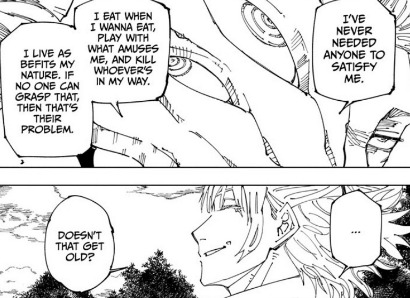
Sukuna's Anti-Enlightenment
Sukuna's words in this chapter practically mirror Mahito's words to Junpei from much earlier in the series.
"Do you understand? Life has no weight or particular value. Just like how water flows through the earth, life simply flows. For you, me and everyone else - it's the same. Without meaning. Without value. That's why you can do whatever you want. Live the way you want. Don't limit yourself to just being indifferent. There's no reason to live by such a restricting philosophy. If you're hungry, eat. If you hate, kill."
Both of these characters are rejecting humanity's natural instinct to look for a purpose in life and are instead subscribing to a more animalistic way of living following their basic instincts, if you're hungry eat, if you hate, kill. While the philosophy sounds simple enough there's something much more complex going on under the surface that requires digging deeper into Sukuna's mindset.
A True Curse
By having Sukuna essentially quote Mahito, the story is inviting us to compare them. A literary foil is a character whose purpose is to accentuate or draw attention to the qualities of another character. This term comes from an old technique of placing a thin metal sheet, or foil, behind a gem to make it shine. Sukuna is a character defined by how little both the other characters in story, and the audience understand him, something Yorozu comments on he's simply too powerful and isolated to be understood by the rest of humanity and so he stands alone. Which is why giving him a foil is a way to help the audience understand Sukuna without the author tipping their hand and ruining Sukuna's mystique. The question is what does Mahito highlight about Sukuna, and my answer is Sukuna is what Mahito wishes to be.... a True Curse.
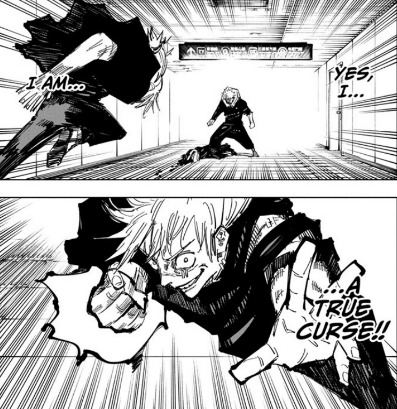
Mahito is many things, but without making this entire meta about Mahito his primary goal along with the rest of the special class curses is to eradicate humanity and replace them as the true humans. They basically want to destroy what humans have created and create a world of curses in their place.
Mahito is the most human like of the curse family, he reads human books watches human movies, even spends time getting to know a few humans personally and he also rejects them the strongest because he is made up of the human fear of other humans. Mahito is the one who reflects humans the most because all the other curses are made up on natural disasters, and yet he wants to destroy everything that's human inside of him and embody a true curse instead.
Which he does in the final phase of his fight against Yuji by literally ripping off his own skin like it's a chrysallis so he can emerge in a more curse-like form. Mahito is like the frankenstein's monster of the human id, he is created by the absolute worst impulses of humanit yand therefore rejects humans implicitly.
He even argues with his fellow curses that they shouldn't act too much like humans. Whend Choso, Jogo and Mahito disagree about whether or not they should revive Sukuna, Mahito argues they've been following Kenjaku's strategy too closely and they should make a game out of it and follow their whims or desires like a curse would isntead of using strategy like Kenjaku.
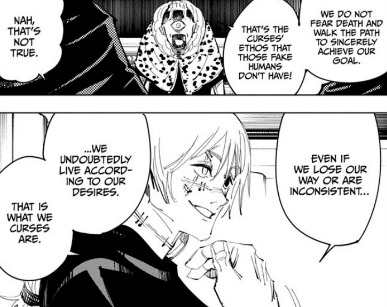
Mahito's idea of a curse is a creature of the natural world that lives entirely true to its own desires and hunger, satiating it without thinking about the effects their actions have on other people. A lion doesn't stop to ponder whether or not the gazelles its grazing on have feelings. A curse rejects the human need to fight purpose in life, or find deeper meaning or reasons behind their actions and only follow their instincts.
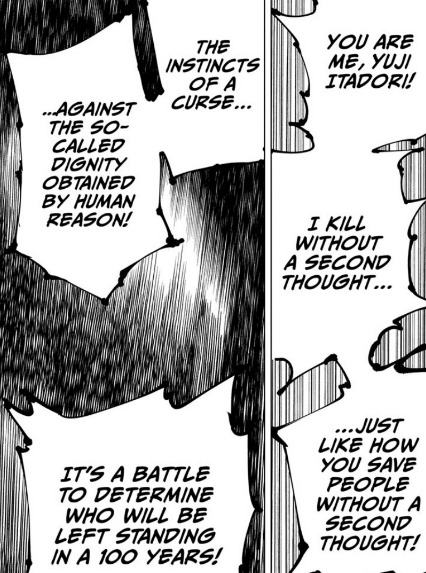
Mahito doesn't just not think about the meaning of life, he actively rejects there being any other meaning besides living to satiate one's needs. Remember Mahito and Sukuna both laugh together at Yuji, and Yuji identifies them as true curses as well.
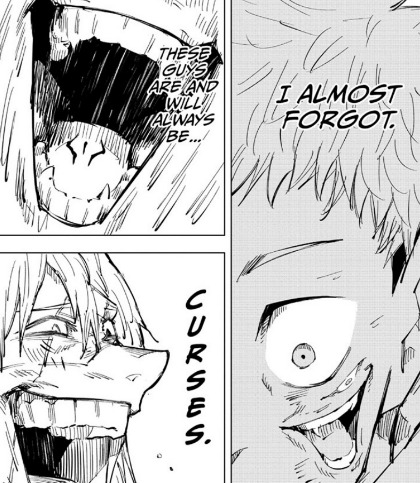
A scene which is called back to later on in the series shortly after Sukuna takes over Megumi's body.

In a series where even characters like Gojo and Kashimo who view other people as not human in the same way they are will have an aching loneliness and a desire to connect to others, Sukuna and Mahito both seem completely devoid of any humanity whatsoever.
Mahito however, is a baby and a newly formed curse while Sukuna is an adult that's existed for 1,000 years as the pinnacle of Jujutsu. Mahito is essentially the larval form of Sukuna in the story. Quite literally in fact, because he emerged from the chrysallis by ripping his skin off to reveal his true curse form in his final bout with Yuji. Sukuna is what Mahito wants to be when he grows up. Mahito talks the talk, but Sukuna is actually able to walk the walk.
It's a bit like how Gojo, Naoya, and Toji all sort of believe that power makes it so they exist in a different category of people, however Gojo and Toji have the ability to back that belief up with power whereas Naoya just gets his butt kicked a lot. Naoya even crosses the boundary line between human and curse in an attempt to reach the same level that Gojo and Toji were at.

There's a pattern in the series of characters pushing themselves further and further away from humanity becoming curses and rejecting human values of meaning alongside of it. Going from higher thinking like empathy, philosophy, the search for meaning to lower, more animalistic and instinct heavy thinking. Naoya even says that becoming a curse reminds him of his childhood again like he's completely regressed intellectually.
Naoya: This sort of takes me back. There are things that children can't do that are easy for adults. After you grow up, you can't even remember the time you couldn't do it. Well, this is like that.
Jogo also defines a curse as someone who's true to their feelings, unlike humans who hide behind lies and pretend to be something they're not. All of this to say I don't think Mahito and Sukuna's views are nihilistic per se. Nihilism is rejecting that there is inherent meaning to anything in life yes, but in order to reject meaning you have to question it first. Mahito and Sukuna seem to be rejecting philosophy itself, an anti-philosophy philosophy so to speak. Nietzsche considered animals to be un-historic, because they only existed in the presence and have no history. They are, themselves at every instant because they only know of the now.
“Consider the cattle, grazing as they pass you by. They do not know what is meant by yesterday or today, they leap about, eat, rest, digest, leap about again, and so from morn till night and from day to day, fettered to the moment and its pleasure or displeasure, and thus neither melancholy nor bored. [...] A human being may well ask an animal: 'Why do you not speak to me of your happiness but only stand and gaze at me?' The animal would like to answer, and say, 'The reason is I always forget what I was going to say' - but then he forgot this answer too, and stayed silent.”
Cows aren't nihilistic, they're not anything because they just exist. They just exist as individuals in an eternal moment. They just exist.
Mahito: "Emotions come from the soul. It's too simplistic to call it "heart". People overthink things they can't see. I can see the soul so for me it's nothing special. It's practically the same as the human body. It just exists."
Mahito similiarly says that the soul just exists, there's no need to overthink the meaning of it or try to classify the soul as a "heart" capable of feeling emotions because it's just there. Sukuna similiarly doesn't worry about the past or the present, all humans are just momentary distractions to him and he only lives in pursuit of finding his next meal.
They just eat to satisfy their hunger temporarily, not because they find the food delicious or for any other reason. They're just living in pursuit of their next meal. It reminds me of a passage from my favorite existentialist book series Zaregoto.
"They say food, sleep and sex are the three basic desires of makind. But why are we eating this meal right now?"
"To ingest vitamins."
"Yes. Without vitamins, people die. And thus eating food brings pleasure. Sleeping feels good too, and sex, well, that's obvious. Anything that you hvae to do to stay alive always comes with pleasure."
[...]
"Now let's imagine someone who's obsessed with eating. In other words someone who eats not simply to take in vitamins, but because he's mad for the sensation of eating itself; for the beauty in the very act. The stimulation of his taste buds. The pleasure of feeling the food pass through his mouth. The joy of mastication. The ecstasy of feeling that mushed-up gook flowing down his throat. The feeling of fullness nearly destroying his satiety center altogether. The euphoia taking over his brain. To a guy like that, vitamins or lacktherof are totally irrelevant. The means and end have switched places for him, so now his main goal is something subsidiary. Now there's your problem. Can you still say this is eating? No, don't answer. You and I both know the only possible answer is no. WHat this guy is doing isn't eat. He's just eating the concept of eating."
Sukuna isn't even eating at this point, he's eating the concept of eating. He's eating because the pleasurable sensation of eating distracts him for a little while, and because looking for his next meal gives him something to do while he's killing time before he dies.
2. Anti-Philosophy Philosophy
They're not even saying that life is meaningless, because that's a conclusion you come to after questioning the meaning of life. They reject the questioning of meaning itself, the attempt to understand either life or other people. They're living entirely like lions prowling the sarangetti for their next meal.

"I've never needed anyone to satisfy me. I eat when I wanna eat, play with what amuses me, and kill whoever's in my way. I live as befits my nature. If no one can grasp that, it's their problem."
Mahito rejects the heart, Sukuna rejects love, both of these things are more complicated human desires than just eat until your stomach is full and kill or be killed.
Sukuna and Gojo both say "Tenjou, Tenge Yuigadoksun - above heaven, under heaven, I alone am worthy of honor" but only Sukuna goes on further to say "all that exists is my pleasure and displeasure". Even Gojo wants to be understood by others even if he thinks that normal people can't understand him and he exists as a different species from them, but Sukuna himself even rejects the fact people might understand him. They do, or they don't, it doesn't matter to him because he only needs to udnerstand himself. Sukuna's practically lapsing into solopism here.
Solopism is the philosophical lens that only one's mind is sure to exist. Knowledge outside of one's own mind is unsure, the external worlds and other minds cannot be known and might not exist outside the mind.
Solopism builds on the failure of Descartes maxim "I think; therefore I exist" which fails to provide any real details about the nature of the "I" that has proven to exist. Solipism asserts the only thing certain is the "I" - one's most certain knowledge is one's own mind, my thoughts, my experiences, my emotions. There is no link between the occurence of a certain conscious experience or mentals tates and the "possession" or behavioral dispoistions of a "body" of a particular kind. The experience of a given personality is private and only understood by that person. The solipistic view of Sukuna is that his experience in the present, what he's feeling, is the only thing that matters and everything else may as well not exist.
I'd only say it has things in common with solipism though, because even Solipism questions reality which Sukuna doesn't question anything. Suuna doesn't feel the need to question things or grow because in his mind his understanding of himself is perfect and complete which is why he doesn't need anyone else's comprehension of him.
In freudian psychoanalytic theory you could align Sukuna's behavior to the ID (I Desire). Jung and Freud both believe in a divded consciousness, but Freud divides it into three, the id, the ego and the superego. The id is the insintcts, superego is the higher thinking like morality, and the ego is the mediator between the two. The id is the most primitive and instinctual part of the mind. For example a child is said to be all id, because they don't understand rules or other people's feelings they only want to fill their basic needs. Mahito would be the childlike aspect of the id, because he is a newborn fledgling cursed spirit.
The id also follows the pleasure principle, which Sukuna's philosophy also follows "all that exists is my pelasure and displeasure." Freud argues the pleasure principal is an ingained survival instinct "what decides the purpose of life is simply the programme of the pleasure principle". The Id is made up of the life-sustaining activities such as eating and sex, and it makes these things pleasurable so we will pursue them. However, there's also a counterpart to the pleasure principle in the human psyche that is the reality prinicple, which is the human capacity of defer gratification of a desire when a situation doesn't allow you to have immediately what you want. The id is ruled by the pleasure principle, and immediately wants all of its desires granted at the cost of everything else, but mature human egos are able to delay instant gratification for a higher objective.
Sukuna basically lives by the rule of the pleasure principle. He's shown capable of long term planning if he needs to like taking Megumi's body, so he's not incable of delaying instant gratifciation but at the same time his ruling princple seems to be seeking immediate pleasure. Sukuna is a walking appetite, he literally has a mouth on his stomach.
There's also the alchemical trinity to consider, mind, body, and soul. In this Sukuna is the body. Not only is he a body hijacker who has literally transformed Megumi's body practically into his own, but he also only lives to satiate the phyiscal needs of the body.
This is where Sukuna would differentiate himself from solipism though, because he needs to exist in a physical body. His entire quest over the course of the manga is to regain a body, he needs to eat, he needs to fight physically, he wouldn't be comfortable just existing as a brain within a jar he needs to stay in the physical world. He lives for the physical pleasures of this world.
What about the Body character? There isn’t one in every alchemy story, but when this does appear, the markers are predictable. Body characters are focused on their bodily needs--they are hungry, thirsty, and, in adult stories, lusty. And they are often fearful. Think of Papageno in Mozart’s opera, the Magic Flute, who breaks his vow of temperance and starts eating and drinking on stage, lamenting his lack of female companionship. Or Wiggins in The Little White Horse (he’s a beautiful, vain King Charles spaniel, always focused on his next meal). Or Sméagol/Gollum, who eats compulsively though his main lust is for the Ring.
Sukuna for instance wouldn't be happy living like Tengen who exists far outside of humanity simply observing others, because he has a need to interact with the world in the form of eating, or experiencing earthly pleasure.
In fact after going through several philosophies which don't quite describe Sukuna's own philosophy (because it resembles these while inherently rejecting the need for philosophy) we might come to the closest comparison for what Sukuna's desire is, which is to exist for as long as possible on the earthly plain while filling up his stomach.
Sukuna is comparable to the Celestial Demon Mara in budhist mythology, more on it in this thread. In budhist cosmology, Mara is the "personification of the forces antagonistic to enlightenment."
Devaputra-mara specifically is the deva of the sensuous realm, who tries to prevent Gautuma Budha from attaining liberation fro m the cycle of rebirth the night of his enlightenment. The existence of Mara is to defy Budha, and specifically to prevent his escape from the cycle of the world, especially the sensuous realm. He exists in opposition to the three marks of existence too.
Number one impernanence, that all existence, without exception is "transient, evanescent, inconstant".
Number two Dukha "Suffering, pain, unsatisfactoriness" is inherent to life.
Number three antaa "Non-self, non-soul, no-essence."
If the ultimate goal of budhism is to escape the cycle entirely and stop being reborn in the sensuous realm, Maara instead tempts people to stay in this realm. it defines impernanence by suggesting we stay in this realm forever. It defies Dukha by saying we indulge in physical pleasures in this realm, that we should seek to satisfy ourselves even if budhism argues that life is primarily unsatisfactory. Then if the ultimate goal of existence in budhism is the "non-self" to escape ego, Maara argues we should remain trapped as ourselves forever.
We even see Sukuna literally tempt a budha-like figure into remaining in this earthly realm. After all aren't we shown that Gojo achieved enlightenment at seventeen and let go of earthly emotions like the need to be angry and avenge Riko's killer because the feeling of oneness with existence was too good in that moment.
A lot of people noticed what they thought was Gojo acting out of character in the fight with him and Sukuna, by enjoying the fight and choosing his selfish desire to love jujutsu and fight as a sorcerer over his responsibiltiy to protect children. Something which Nanami says in his dying hallucination that Gojo only ever lived for the pursuit of his selfish desire for Jujutsu in the first place.

Gojo, a character that we know has a higher minded ideal that he's fighting for the next generation of sorcerers is shown losing that ideal in the fight with Sukuna, and only caring about his earthly pleasures, having a satisfying fight against a strong opponent. You could even say that was Sukuna's goal in the fight, to strip off Gojo's fish scales so to speak and reduce him back to being a normal human being. Something which he accomplished when he managed to learn to cut the space that Gojo inhabited, therefore negating the infinitity that protected him and dragging him back to this earthly realm.
"This is goodbye. You were born in an era without me and hailed as the strongest yet you turned out to be painfully ordinary..."
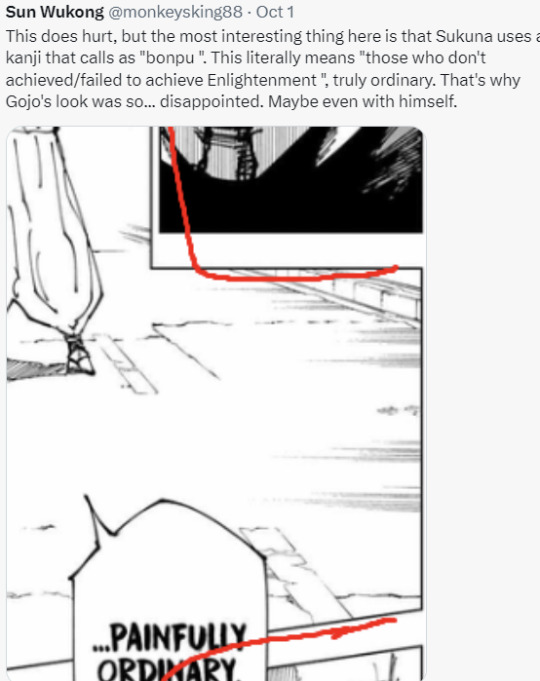
In a way Sukuna tempted Gojo away from enlightenment and succeeded. The linked thread goes on to say that Budha defeats Maara to save his students during his temptation, but Gojo on the other hand died and failed protecting his students specifically because he chose the earthly pleasure of seeking to have fun in a fight over the well-being of his student Megumi who's body was possessed.
He made a human being again out of an enlightened Gojo, and dragged him back to morality and the cycle of death and rebirth by making Gojo care more about his selfish desire for a fight than the principles he fought for. Sukuna trapped Gojo in the mortal realm along with him.
Sukuna's philosophy sounds like Mara's too, that rather than seeking anything better you should just distract yourself from the unhappiness of life by indulging in pleasures to stifle your misery.
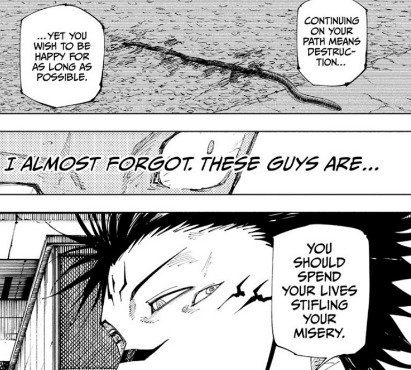
I'd say Sukuna lives the same way. He doesn't consider himself weak, but he doesn't talk about life or this world like it's a fun place to be. He tells Yuji to stifle his misery. He then admits to Kamo that his purpose in life is just to eat delicious things to kill time until he dies.

"Life is just killing time until you die" sounds like a miserable kind of hedonism, since he's only distracting himself from the unpleasantness of life. Sukuna too might just be spending his life stifling his own misery by seeking endless pleasure on earth. He doesn't want to escape earth however, he wants to remain on earth for as long as possible. Kamo even pointed out the strange contradiction in his own philosophy.
Sukuna insists he doesn't need to be understood by others, that he's not alone, that fighting and eating his way through life is enough for him because he understands himself and all life is just enertaining yourself until you die anyway, but Kamo asks why if he's just satisfied with that kind of life did he go to the trouble of ripping his soul into twenty pieces and trying to regain his body 1,000 years later.
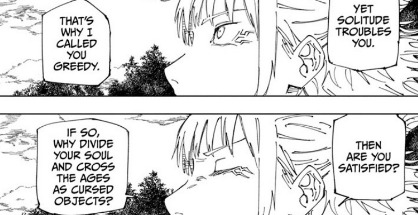
Sukuna notably avoids this question. He doesn't tell Kamo why he even bothered to divide his soul up and extend his life if he's perfectly satisfied with life as it is. We don't get the answer to why he wants to possess Megumi or is going through all this trouble.
That's where we get to the greatest snag in Sukuna's philosophy, which ironically relates back to the tug of war between the pleasure principal and the reality principal.
Sukuna's philosophy is that he's never needed anyone else "I've never needed anyone to satisfy me. I eat when I wanna eat, play with what amuses me and kill whoever's in my way. I live as befits my nature. If no one can grasp that, then that's their problem."
The big glaring flaw in Sukuna's philospohy that he's only ever needed himself is kind of like the flaw in the american "pull yourself up by your bootstraps philosophy" its that everyone including Sukuna needs other people. Sukuna isn't fighting with his own strength alone right now. He stole it from Megumi. He could have conceived of a way to beat Gojo without the Ten Shadows yes, but right now Sukuna wouldn't even be able to exist in the physical world without Megumi's body.
He is literally a parasite in a teen boy's body, using him to his own ends and yet he insists that he's the only one that exists or matters and he's always been able to accomplish everything he wanted with his own strength. Sukuna's a parasite right now, arguing that he's the greatest individual and has never needed or relied upon anyone.
The Great and Mighty Sukuna is defiling a young person's body for his own gain, the same way that Kenjaku defiles women and his own children, the same way that the elders manipulate the young in Jujutsu Kaisen to maintain their power base in Jujutsu Society. This supposedly all-powerful erson who only ever relies on himself and only needs his own ego wouldn't even be alive right now if he wasn't paraisitizing Megumi's body, yet he argues that he's completely fulfilled in himself.
A freudian perspective argues that a mature ego finds a balance between the pleasure principal (the need for instant gratification) and the reality principal (the ability to defer instant gratifiaction when the situation doesn't allow for it). Whereas a child is only ID and only cares about fulfilling their most basic needs first and foremost.
Sukuna is paradoxically presenting his views like he's a fully realized, enlightened adult the absolute peak of sorcery, the most developed and intelligent sorcerer in the world, etc. etc. yet he has the underdeveloped ego of a child because he has no grip of the reality principal. A person who doesn't interact with other people or the world, can't learn or grow from it. Which is probably why the closest character you can compare to Sukuna is Mahito, a literal child and a newborn curse. Even Mahito fails to become a true curse in the end.
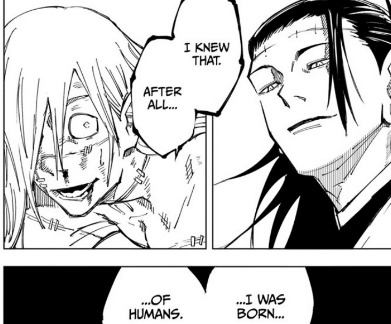
Sukuna says he rejects enlightenment, and any higher philosophy in order to remain in the earthly realm forever, but one wonders if that isn't the same as the Miltonian Lucifer rejecting heaven to reign in hell.
The mind is its own place, and in itself Can make a heav’n of hell, a hell of heav’n.
What matter where, if I be still the same, And what I should be, all but less than he Whom thunder hath made greater?
Here at least We shall be free: th’Almighty hath not built
Here for his envy, will not drive us hence: Here we may reign secure, and in my choice
To reign is worth ambition, though in hell; Better to reign in hell than serve in heav’n.
The theme of Paradise Lost is that any sinner, even Lucifer, can stop at any time and seek forgiveness instead. However, Lucifer chooses not to do that. He could leave hell at any time but he chooses to stay. He’s fine in hell after all. He’s totally gotten used to the temperature by now. Everything is fine Lucifer says, while everything is on fire.
Lucifer would rather stay in a hell of his own creation because it gives him the illusion of control over his life then admit he was wrong or give up that control.
He may be king of hell however, but he's still in hell. Hell is not exactly the most pleasant place to be. King he may be, but he's trapped here the same as everyone else.
Sukuna may be the closest a character has come to being a true curse, he might have transcended humanity, the human need for love, but he still can't escape the earthly realm. In fact his entire philosophy is a mara-esque avoid enlightenment and stay in the earthly realm as long as possible. In a series where characters like Yuki and Kenjaku are trying to evolve cursed energy into something different, either by completely removing it, or by optimizing it and forcing it to take a new form Sukuna is someone who is stagnant and resisting that evolution. Why would someone who's already perfect need to evolve in any way?
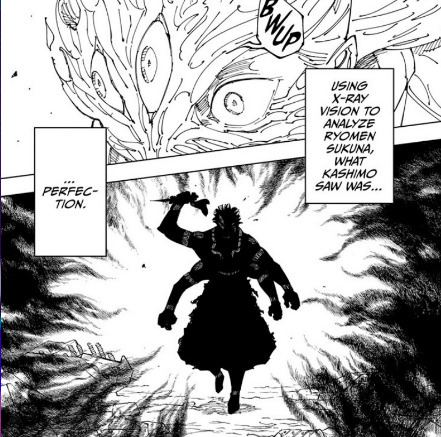
That might just be Sukuna's downfall in a way. By rejecting other people, by rejecting the human need to seek meaning in life, he may have made himself completely stagnant. After all if Sukuna already accepts everything about himself, if he is a fully realized individual then why would he need to change?
He can steal techniques and knowledge from others of course, but that's what he always has done. The real question is how would Sukuna who's the perfect sorcerer, who's never been anything other than a sorcerer and lives to be one, exist in a world where the definition of what a sorcerer even is will probably change by theend of the manga?
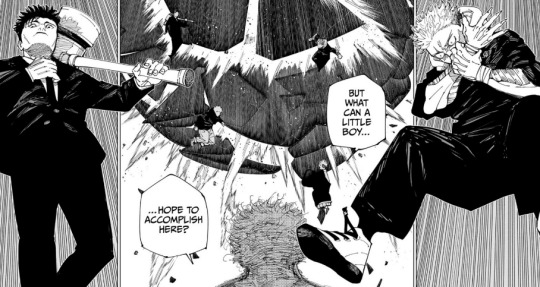
So Sukuna may ask "What can a little boy hope to accomplish here?" but a child like Yuji is capable of the one thing that Sukuna isn't, growing and changing into something better.
#jjk meta#ryomen sukuna#mahito#jujutsu kaisen#jjk 238#jujutsu kaisen 238#jjk spoilers#jjk 238 spoilers#jujutsu kaisen 238 spoilers#yuji itadori#itadori yuji#sukuna
573 notes
·
View notes
Note
Would T-Rex from Dinosaur Comics / Qwantz comics by Ryan North survive?
I feel like this is in large part going to be based on whether or not t-rex blood is vamp food & if t-rexs can be mind controlled??? Might come down to an actual fight.
T-Rex probably stomps on the woman with a crucifix, but he doesn't shave, so probably ok. He does have a personal friendship with both God & Satan though?
T-Rex is not great at social niceties, so I don't know if Dracula will want him around for very long, but T-Rex is also a dinosaur so I don't know if Dracula can actually get him to leave. Maybe they bond over being apex predators???
T-Rex can definitely not climb (those lil arms!), but he might be able to out predator the wolves & eat them.
I am going to apologize in advance for the fact that I just do not possess the philosophical education or terminology to give this subject the treatment it deserves. When it comes to philosophy, I possess the wisdom of Socrates: I know what I do not know. I know that the three characters of Dinosaur comics embody different philosophical archetypes. I know that T-rex's rhetorical style has a name, as does his axiology. I could not for the life of me tell you what they are. I remand the deeper analysis to Philosophy Side of Tumblr
Given the metaphysical reality of the comic strip, I think it is fair to understand T-rex as an ensoulled being, in which case his blood might be attractive to Dracula. I am not up to date on the scientific thinking around the penetrability of tyrannosaur skin, but they definitely don't osteoderms and I don't believe we have found any evidence of scutes or scales. We have also found zero evidence of feathers, despite looking really really hard, and so while the current understanding is that feathers on dinosaurs are the rule, not the exception, T. rex seems to have been exceptional. Which is moot because T-rex the character definitely lacks them. So I am going to say that Dracula can physically bite T-rex and has a tentative interest in so doing.
T-rex has a strong interest in religion on a philosophical level, but he is definitely not Anglican. He would accept the crucifix specifically to argue with Utahraptor over whether or not it was idolatrous - though I don't think the townsfolk would offer it given all the stepping on dudes and houses he gets up to. And as you say, he doesn't shave. He also has no need of mirrors, as he already knows how cool and sexy he is.
On that level, I think he would be difficult for Dracula to psychologically torment. Now, while it is true that Jonathan Harker also goes into Castle Dracula already knowing how cool and sexy he is, and that provides him some level of protection, he's just not on T-rex's level. I would venture that not even Zaphod Beeblebrox is on T-rex's level, which is impressive because Zaphod literally has an ego the size of the entire universe. I don't think T-rex can be gaslit, because he would enthusiastically take any doubts about his own sanity as a jumping off point for philosophical examination and possibly epistemology. He probably is susceptible to Brain Fever. When Ornithomimus finds him in Budapest he doesn't know who he is but he knows his genitals are GREAT.
The main source of conflict will be that both T-rex and Dracula really like hearing themselves talk. I don't think Dracula would be very pleased slipping into the role of Utahraptor and letting T-rex take the lead - and T-rex can't stop being the thing that he is any more than Dracula can. If they can work out a mutually satisfying conversational structure, I think T-rex could keep Dracula entertained indefinitely. He would definitely have thoughts about changing attitudes towards violent conquest. They might discuss the nature of the soul and the extent to which treating it as transactional (eg in Faust) is compatible with Christian teaching, or whether you can be damned without your own participation (say, by being turned into a vampire). T-rex may be curious about dabbling in vampirism provided he can do so temporarily - which, given T-rex, he is confident he can.
T-rex definitely cannot climb down the wall with those itty bitty arms. He probably can't fit through the window. On the other hand I am not sure walls can contain him (there are no walls in the comic save on the stomped cabin). I do not think he would be deterred by Dracula's doors or his wolves.
So I think T-rex of Dinosaur Comics can survive Castle Dracula, and raise some very interesting questions while he's there
Unrelatedly, the @wheresjonno project last summer ended up giving Jonathan Harker a pet T. rex named Hamlet, but she's an entirely different character who doesn't fit in the London Underground. Nevertheless.
153 notes
·
View notes
Quote
[Epistemology] is supposed to explain how knowledge is possible, and to do that in some a priori way which both goes beyond common sense and yet avoids any need to mess about with neurons, or rats, or questionnaires. Given these somewhat exiguous requirements and no knowledge of the history of philosophy we might well be puzzled about just what was wanted and about where to begin. Such puzzlement can only be alleviated by getting the hang of terms like "Being versus Becoming," "sense versus intellect," "clear versus confused perceptions," "simple versus complex ideas," "ideas and impressions," "concepts and intuitions." We will thereby get into the epistemological language-game, and the professional form of life called "philosophy."
Richard Rorty, Philosophy and the Mirror of Nature
#philosophy#quotes#Richard Rorty#Philosophy and the Mirror of Nature#epistemology#knowledge#justification#language
105 notes
·
View notes
Text
Fated Love in Astrology
So, every person has a divine partner that they are meant to be with. Your union with your other half (I hesitate to use the world “twin flame” only because of how misconstrued it is in mainstream astrology/spirituality discourse) depends entirely on both of your individual spiritual awakening and commitment to the spiritual path.
In astrology, the 7th house represents marriage, or, as I like to call it “union”. The 7th house, is the 7th house from the 1st house. It is the descendant to your ascendant. It is the shadow to your ego. Whenever we cross paths with an individual whose luminaries fall to our 7th house, it creates a very magnetic & intense attraction. It’s almost inexplicable what you feel for each other.
With that said, this sort of connection is not logical or rational. It defies all norms. The key to recognizing your divine partner is the intense attraction you feel towards them right away. There is no hesitation or second guessing, you’re simply awestruck by them. Nowadays, we all have a very tedious approach to relationships (due to our collective trauma and bad experiences), everybody walks around with a checklist to find someone who will fit their criteria but that is not how Divine Love works. You just know instantly that there is something different about this connection. That is not to say, the nature of the relationship will be easy. Fated connections are never easy and not everyone is meant to find their Divine Partner.
When such a person comes into your life, it usually triggers your ego death; they become responsible for you losing the shell of identity you held close to you. All your fears, your shame, your vulnerability comes to the forefront and you have to confront everything you’ve ever repressed. It leads to a dissolution of self.
In Sufism, there is the concept of “fanaa” which can be translated to “annihilation”. In order to merge oneself with God, it is first necessary to annihilate everything that you consider to be you. It’s important to "to die before one dies". Love & Worship are very closely intertwined. This is exactly what “twin flame” connection feels like. You rid yourself of your ego, you dissolve your sense of “self”. Sounds intense? That’s because it is. It irks me when people talk about twin flames in a casual way because a) not everyone has a twin flame b) this is not a fun experience in any way, shape or form c)This is the least casual of experiences
(I am using the word twin flame here only because it is a term that more people are familiar with, I wanted to speak of the spiritual background of that experience whilst using a term that’s already familiar)
In Jungian psychology, there is the concept of anima/animus, which refer to the unconscious masculine aspect of a woman and the unconscious feminine aspect of a man respectively. One aspect of being a “whole” human being is to integrate these unconscious parts into yourself. This is similar to what a twin experiences, your other half seems to be in the shadow, hidden from your view, crossing paths with them, brings that realization to you and now in order to unite with them, you must first dissolve yourself and merge with that unconscious image of them.
There is a reason why twins “mirror” each other; they are a reflection of you and vice versa. This is why every interaction with them strikes a nerve in you and you feel their absence like a phantom limb.
If you’re on a twin flame journey or would like to know more about it, I suggest immersing yourself in Sufi philosophy. To a lay person, the Sufi concept of Love may seem dramatic and over the top but for those in the know, it will seem deeply familiar, because ultimately your longing and yearning for your “twin” is your innate longing to seek union with God/the Divine. We were all made in pairs and to know the other is to know God and to know God is to know Love.
These connections are presented to you in order for you to ascend. Why were you chosen for ascension over millions of others? That’s the divine plan, not up to us to question. It is entirely possible to meet such a person at a time in your life when you’re completely spiritually unevolved (this is very common) and they usually trigger your dark night of the soul. This leads to positive disintegration although nothing about this experience feels positive in any way, shape or form.
Actually uniting with your twin and sharing a life with them is a long shot. Its often an unrequited love. It requires A LOT of work by both people. There is a lifetime of purging, integration and inner work before union could ever be a possibility. Most people who use the term “twin flame” are using a fancy spiritual label to describe their excessive interest in someone. You don’t have a twin flame, you’re just manic.
In Arabic literature, there are 7 stages to love, it is as follows:
1. Dilkashi or attraction
2. Uns or attachment
3. Mohabbat or love
4. Akidat or reverence
5. Ibadat or worship
6. Junoon or madness
7. Maut or death
If you believe you’re experiencing a twin flame connection, you have probably gone through these stages, maybe not in this order but you’ve probably experienced all of these.
You experience an inexplicable attraction that draws you to them, regardless of how far you stray from them, your heart clings to them & forms a deep attachment, even though you don't seem to understand it, you're consumed by love for them, without even knowing why, this love morphs itself into reverence and soon enough it's eclipsed even that & embedded itself as worship. Your feelings for them are so strong, intense and powerful even in separation, even in their absence that you feel yourself going mad. This madness is key because it brings you to the death of "self". You lose all sense of who you were before you met them. You're ripped of your ego. You die and die and die again, hoping to taste the love that will give life to you.
There are astrological indicators obviously but just because these aspects/placements are present, does not mean they are your twin flame. The biggest indicator is the deep sense of knowing you have in your soul, you don’t even have to know the word “twin flame”, you’re experiencing a magnetic, excruciating and tortuous kind of attraction.
Some indicators:
1. Venus in 12h
2. Venus in Scorpio
3. Primary Scorpio or Taurus placements (the Taurus-Scorpio axis creates the most intense chemistry between two people)
4. Moon conjunct Mars
5. Opposite signs occupying many placements (Virgo-Pisces, Cancer-Capricorn, Gemini-Sagittarius)
5. 7h synastry
6. Bharani nakshatra
Uniting with your twin can trigger your kundalini awakening. It is not for the faint of heart. Union is a very intense experience. Much has been said about twin flames and tantric sex. Imo? What we call Tantric sex is essentially the heightened feeling and intensity of sexual experience that a Tantric practice brings about. (its possible to feel this way with a non-twin if you have a disciplined Tantric practice).
Sex is the source and root of everything. It is the cause of creation and nothing less than divine. Eros is the first god that could be conceived by man, he is the creator of all beings and ruler of the universe. He is son of Chaos, the original primeval emptiness of the universe.
Longing, desire and Eros, all go hand in hand. When your soul has longed for someone for so long, the sheer passion and enormity of desire will make it a very one of a kind experience. Short answer being that sex with your twin will be out of this world and life changing.
In Sufism, there is a concept called baqaa which is subsistence through God. Someone who has experienced fanaa, or annihilation of the ego and self, finds God, unites with him and sees him in everything. This is what love of a “twin flame” nature does. It is all consuming and potent, you cannot walk away from it, even brushing with it briefly, transforms you. It purifies you and strips you of your pride, shame, fears and everything that you thought was “you” but the reward for this is understanding through first hand knowledge, a love so all encompassing, expansive, deep and profound that it forever alters the way you look at the world. You begin to love everything and everyone because you’ve tasted true love and its generosity.
Karmic Partnerships
These are extremely common and almost everyone has one. They need not strictly be romantic. Many non-romantic associations can be karmic. These people to put it very plainly, come into your life, to teach you lessons. They need not explicitly be “bad relationships” but the energy is definitely not light hearted and its absolutely not meant to last a lifetime. You are meant to learn your lessons and move on from them and break the karmic cycle. However there are people who do not do this and stay stuck in the same patterns and perpetuate the same cycles.
Some indicators of Karmic Partnerships in astrology:
1. 12h synastry
2. 8h synastry
3. Saturn aspects
4. Capricorn/Libra placements
Soulmates
These are the most wholesome, fulfilling bonds between two people. Soulmates need not always be romantic. The bond is kind of instant and inexplicable. You just get each other. It feels fulfilling, empowering and light. It fills you up. There is no angst and there’s no chaos.
Some indicators:
1. Moon signs that are compatible with each other
2. Moon aspects that are positive
3. Venus-Ascendant aspects
4. 5h synastry
5. Strong Venus or Jupiter aspects
6. Element compatibility (fire & air vs water & earth)
🧜🏼♀️🧜🏼♀️🧜🏼♀️🧚🏼♂️🧚🏼♂️🧚🏼♂️🦋🦢🦢🦢🦋🧚🏼♂️🧚🏼♂️🧜🏼♀️🧜🏼♀️🧜🏼♀️🧜🏼♀️🧚🏼♀️🧚🏼♀️🧚🏼♀️🦋🦋🦢🦢🦢🧜🏼♀️🧜🏼♀️🧜🏼♀️
I’m sorry if I sound a little too esoteric on this post 😭😭😭idk how else to talk about this stuff and I tried my best to make it sound as simple as I could 😭I hope this was interesting and if you guys have any questions feel free to ask me💛💛
Further reading:
1. Plato’s Symposium
2. Sufi philosophy and poetry
3. Carl Jung’s works
#soulmates#twin flames#twin flame astrology#twin flame#soul mate connection#astrology#sufism#carl jung#bharani#vedic astrology#astro observations#soulmate indicators
495 notes
·
View notes
Text
Bookworm to Benchpress

I couldn’t stand my roommate, Caleb, at first. Our online conversations before university had led me to believe he was someone similar to me—reserved and bookish occasional gamer. But the person I met was a whirlwind of energy that exuded force, a stark contrast to my quiet demeanor. Caleb was the epitome of a dude bro, his boisterous charm drawing people like moths to a flame. His presence was overwhelming, and I often found myself irritated, yet intrigued by his larger-than-life persona.
Caleb's influence began subtly. He would often encourage me to join him for early morning workouts. "C'mon, bro. It's good for you," he'd insist, his enthusiasm chipping away at my reluctance. The gym sessions were grueling, yet there was a sense of camaraderie that I couldn’t help but enjoy. His philosophy of 'being built different' was both baffling and inspiring.

Gradually, I found myself being pulled into a more disciplined lifestyle. Caleb was a force of nature, waking up at the crack of dawn with a zeal that was infectious. "Discipline starts with the dawn," he'd proclaim, and I found myself mirroring his routine. I began with 50 push-ups each morning, a task that seemed insurmountable at first, but grew easier with time. Breakfasts transformed from sugary cereals to eggs and orange juice, fueling my body in ways I hadn’t imagined.
Then came the cold showers, a practice that initially felt like torture. "It's about pushing your limits, bro," Caleb would encourage, a mischievous glint in his eye. I begrudgingly started, each icy blast a battle of willpower. But with time, what was once a dreaded experience became a refreshing challenge.
The changes in me were not just physical. My confidence soared, and I found myself engaging more with others, stepping out from behind the safety of my books. My clothes fit better, and my posture improved. Caleb’s influence was unmistakable. "Show off that progress, man! Your life is defined by discipline," he'd say, his encouragement a accompanied by a pec dance.
Our relationship, initially strained, evolved into a mutual respect. I realized that beneath Caleb's flashy exterior lay a deep commitment to self-improvement. His antics, which I had once found abrasive, were now moments of inspiration.
One evening, after a particularly intense workout session, Caleb opened up about his philosophy. "Being disciplined isn't just about the gains or the girls," he mused, a rare seriousness in his tone. "It's about loving the journey, the daily grind. It's about finding joy in discipline itself. That's the real reward."
His words struck a chord within me. Caleb, the embodiment of discipline, had unwittingly become a mentor, guiding me towards a path of self-discovery and growth. His relentless pursuit of excellence had become my own, a shared journey that transcended our initial differences. In that moment, my respect for Caleb deepened, transforming my once intolerable roommate into an unlikely source of inspiration.

#nerd to jock#discipline#male transformation#male tf#workout tf#bodybuilder tf#new life tf#dudebro#dudebros#america fuck yeah
229 notes
·
View notes
Text
Astrology Observations
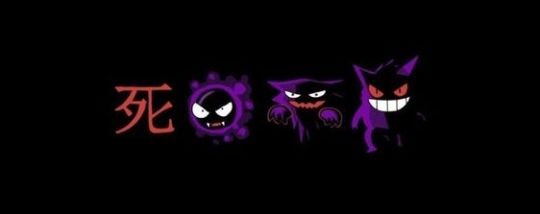
DISCLAIMER: This is based on my own experiences and research it does not mean it's inherently true!!
Pisces Placements aren't intentionally fake but switch up so quick. I have had so many pisces placement friends that r just so wishy washy. Pisces Venus depending on the person will literally choose shitty partners over even their closest friends! They just want to fit into the mold their partners create for them so bad u won't even recognize their personalities sometimes in certain relationships smfh.
Taurus Placements get just as jealous as scorpio and can be JUST as bad about it. Have you ever dealt with a Taurus who felt lesser than you? just terrible.
Pluto in sag is an interesting generational placement. It's cool to look at how it shows up. The way ppl are so self righteous and like to flaunt how their life philosophy is best. Going on social media spreading dogmatic beliefs and wanting to be a teacher but actually guiding people into the dark. Unrealistic morals & ideas that are half-baked and rooted in egotistical projections of what people deem correct. Even if the legitimacy is questionable at best. The way there is an excess of waste, consumerism, and lack of appreciation of it. The rise of fake spiritual influencers & conversations being hd around xenophobia, racism, religious beliefs & cultural appropriation.
Pluto - Mercury people seem to be able to develop telepathy fairly easy or have a natural predisposition towards it? A lot of my friends who are clairaudient or sometimes hear other ppls thoughts have Pluto - Mercury aspects.
Gemini Moons are actually very emotionally nuanced and understanding, I feel like Aquarius is the main air sign who tries to rationalize the emotions of OTHERS. I feel like Gemini moreso tries to understand every aspect of something. The emotional and logic, the dynamics of it all, the duality.
Libra Moons seem to be more selfish than both Aquarius AND Gemini moons. It's not that they don't care about others, but the way they think/feel (which isn't surprising considering they're aries sister sign) is usually in relation to how people feel about THEM. What people think of them, how they are being perceived. How they can be liked more, etc. That's not to say Libras are not caring about others because they are!! I honestly like Libra Moons, I find them to be very sweet and considerate and if they really love you they are super giving and chill.
Aquarius Moons are solution oriented, they want to figure out how to solve or understand the root of an issue so it can be done and over with. This can cause them to come off as emotionless, dull, and unempathetic. I notice though that immature Aquarius moons are very selfish & think they're the only ones who suffer. I see that in immature capricorn moons as well. I believe it has to do with saturn.
Libra Mercuries are so poetic imo
Virgo is literally ruled by mercury, the only way you're going to find them boring is if they don't trust you enough to open up to you or converse with you. They are extremely intuitive & pick up on the patterns of others easily. More often than not it usually only takes a virgo a small period of time whether it be minutes or days to decide they actually just don't like you and don't want to engage with you. They also tend to mirror, so if you're boring maybe that's why you think they're boring.
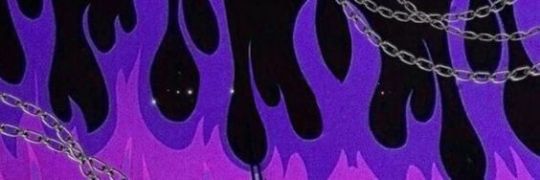
#astro observations#astrology notes#astro community#astrology#pluto in sagittarius#libra moon#libra mercury#Taurus#Pluto - Mercury#Gemini Moon#Pisces#Pisces Venus
2K notes
·
View notes
Note
HI BELOVED !!! i already requested meet me halfway BUT i also want to request “Mirrors” by Justin Timberlake for Suguru . . maybe angst to fluff ? 😁
Mirrors
Word Count: ~1.1k
cw: friends-to-lovers trope, a little bit of angst, fluff, explicit language
Summary: Suguru Geto, committed to never being committed, has finally met his match: you. When you come to him for comfort after being stood up on a date, he finally decides to make his move.
Author’s Note: Thank you for the request @invisible-mori! I appreciate you! This is a great song for the y2k karaoke party. I hope you like this! Divider by @/saradika.

Suguru Geto gave up on relationships years ago. He figured committing to one person for the rest of his life would eventually become tedious, boring. Besides, it’s easier for him to drift by unattached with all the freedom to do as he pleases.
He won’t deny it though. It’s gets awfully lonely living like this.��
It’s not until he meets you that his mindset begins to change. The two of you started out as friends, meeting by chance one night at a mutual friend’s party. You hit it off immediately; you were drawn to his mysterious charm while he gravitated towards your warmth and bright personality. From the outside, it seemed the two of you were complete opposites. The more you got to know each other, the more you understood how similar you actually are. You’ve been inseparable since.
Geto was never interested in romantic relationships. Lately, his thoughts have been plagued with fantasies of you. A few weeks ago, you stay at his place after a night of drinking. Usually, he’d sleep on the couch while he lets you take the bed, but this particular night, he decides that it’s big enough for the both of you. It isn’t. Tipsy and desperate for sleep, he doesn’t think twice about cuddling you to prevent you from falling off the edge. He knocks out instantly, finding comfort in the way your body molds to his. In the morning when he’s completely sober, he freaks out at how natural it feels to have you in his arms, wondering what it would be like to have you like this every day. Normally, he wouldn’t linger on acts of intimacy. He’s used to the routine one-night stand to fulfill his sexual needs. But with you, it’s different. You’re different. Maybe he isn’t as frigid and closed-off as he thinks he is. Or maybe it took a worthy contender like yourself to challenge him.
It happens so fast that Geto doesn’t realize it until he’s already in too deep. Tonight, you’re supposed to be going out on a date with some guy you’ve been talking to on one of those dating apps. He doesn’t say it, but Geto thinks it’s pointless. He tries to get you to adopt his philosophy on dating. Deep down, he wants you to be lonely like him. He wants the two of you to be lonely together. The idea that you could leave him for somebody else makes him uncomfortable, to say the least. But he doesn’t say anything. In fact, he wishes you, “Good luck,” on the phone when you tell him you’re off to meet the other man.
Nearly an hour later, there’s frantic knocking on his door. He answers quickly, uncertain who could be on the other side, surprised to find you, tears streaming down your face, crying.
Immediately, he wraps his arms around you, holding you tight. It’s second nature at this point. Truth be told, he’s been longing to have you like this since it first happened that one night. Though, his heart aches to see you distraught. His hands massage your back, soothing you. “What happened?”
In between sobs, you manage to say, “He stood me up.”
Geto squeezes you tighter, suppressing the anger erupting in the pit of his stomach. If you asked him to, he’d find this guy and beat the shit out of him. Make him hurt the way he hurt you. But he calms down, focused on consoling you. He leads you to the couch, still holding you, his t-shirt damp with your sniffles. He reaches for the box of tissues on the coffee table, grabbing a few and passing them to you. You take it, blowing into them noisily, wiping your eyes, feeling like a fool. “I’m such an idiot,” you mumble.
He shakes his head. “He’s the fucking idiot. Not you.”
“It was too good to be true. I should have known from the start it wasn’t going to work out.” You stare down at your lap, catching your breath, Geto’s big hands rubbing you lovingly. You always feel safe with him, like he can protect you from anything. That’s why you came to him for comfort. Why you craved his touch.
“Those dating apps can be such shit sometimes,” he says. “I wouldn’t trust them anymore if I were you.”
You lean back against the cushions, sighing. “Then how am I supposed to meet someone?”
He follows you, sinking in beside you, shrugging. “Why do you have to meet someone?”
You nudge him in the arm with your elbow. “You might be okay with being a lone wolf, but I’m not. It’s lonely.”
He rests his head on your shoulder. “I’m not lonely. I have you, don’t I?”
Stuttering, you respond, “That’s different. We’re just friends. I want something more.”
He faces you, gazing into your eyes. “Do you want something more with me?”
You shake your head profusely. “No, you’re twisting my words!” As long as you’ve known him, Geto has been committed to remaining uncommitted. The possibility of him being a boyfriend to anyone, let alone you, never existed. However, recently, it feels like the two of you have been slowly teasing that fine line between friendship and something more. At first, you thought it was just your imagination, maybe even wishful thinking. But now, you can’t help noticing the subtle difference in your relationship. “Why are you even thinking that?” you ask, heat surrounding your cheeks, flustered.
He shrugs once more, smiling, tucking a strand of hair behind his ear. “I don’t know. I guess I just like being with you too much. It’s hard for me to imaging you with somebody else. Maybe that makes me a little selfish, I don’t know.”
You readjust in your seat to face him completely, perplexed by this sudden change of tune. You keep reminding yourself in your head that Suguru Geto does not do relationships. “What are you saying?”
He looks at you, scooting in closer, holding your hand in his. “I’m saying that maybe we should give this a shot. You and me. Something more.” The words spill out of him on instinct. It seems like an abrupt switch, but he’s been considering this for a while now. And tonight, he finally acts on it instead of waiting until it’s too late. Although he’s still upset at that moron for standing her up, if it weren’t for him, Geto probably wouldn’t have the guts to finally admit his feelings.
It takes you a few seconds to process what he’s saying. Eventually, you smile, leaning in to nuzzle your nose to his. “About time, you dummy.”
He grins, closing the gap to kiss you softly on the lips. Commitment isn’t so bad, as long as it’s with you.

#suguru geto#suguru x reader#suguru x you#suguru geto x reader#suguru geto x you#suguru geto fluff#geto suguru#geto x reader#geto x you#geto fluff#geto suguru x reader#geto suguru x you#geto suguru fluff#jjk x reader#jjk fluff#jujutsu kaisen x reader#jujutsu kaisen fluff#y2k karaoke party#milestone event
384 notes
·
View notes
Text
Edit: this post was made months before Diasomnia release.
- Delusional OC sketches and headcanons: Malleus' mama and papa -

*seduce, not saduce lmao sorry I'm tired
Malleus Draconia never met his parents, but Lilia could vividly remember them as if he only last saw them yesterday. Malleus' father (whose name also happened to be Malleus) was a student of his and had a consistent air of superiority about him-- he walked and talked with such confidence befitting that of the majestic horns that adorned his head like a crown. In dragon anatomy, you see, large, beautifully sculpted horns are a clear indicator of how fertile and desirable its genes were. So there was never a doubt that this man was a natural attractor for many a woman.
... Except nobody ever stuck with him. The prince had a terrible personality. He went on and on, on and on with prattling about anything and everything under the sun (actually mostly about weapons and griffons and philosophy and geography) to the point that ladies thought he was self-centered and was looking for a mirror to marry, rather than a wife. That was not true however. He was simply an excitable boy.
He had reached a record age of three centuries (still wifeless) when he decided that being stuck in Briar Valley was limiting his viewpoint of the world. He had enrolled at an academia overseas, and that was when he met his future bride: Matilda. Upon meeting eyes with her, he had known that it was love at first sight. (It was not. He merely thought having another dragon fae as queen would benefit his country.) And so, relentlessly, day in and day out, he pursued her in order to win her affection.
The lady simply treated him like furniture, however.
Still, everyday he would sit at her table in the library. He would first attempt to flirt with her, but as he noticed how focused she was in drafting her blueprints, he would give up and eventually become engrossed in whatever he was studying. He would scribble down notes and make commentaries to himself about this and that, and to be honest... She found that quite endearing. He had a frivolous mouth, but he was earnest in his pursuit of developing his country.
She had been secretly watching him, and one fateful day, she accidentally let out a giggle. A secretive acknowledgment of his presence. And of course, sharp as his draconic ears were, he returned her gaze and happened upon her beautiful smile.
That was when he realized that the words he sang to her-- the "you're lovely as blooming flowers in the spring", "your voice is as melodious as a crystal bell in winter"-- were all very, very true. The next words he had uttered were finally taken straight from his heart, and then for the very first time since they met, she had replied to him with lips upturned in an elegant crescent.
The following year, when he returned to Briar Valley for the holidays, his mother Maleficia almost squealed in pleasant surprise that her son had brought home a lovely bride. It was a blur after that. Lilia could recall how the castle seemed to have turned upside down with how lively it had suddenly gotten; secretive dates, a wedding, a coronation, pregnancy woes, and... a sudden despair.
The couple had created life, but paid for it with their lives.
Whenever Lilia was recalling this story to the toddler he was tucking under the covers, he would come to a sudden halt. Little Malleus would ask why, but he would just shake his head and ruffle the boy's hair.
"I was just thinking how great a king and queen your father and mother had been. They were strong, and brave, and kind..."
"Will I grow great like them, too?"
Lilia paused and gazed into the boy's eyes. Then, with a smile, he stroked his tuft of hair and patted him to sleep.
"Of course, dear. Now sleep. A future king needs to be strong and healthy to be great. You won't grow up without sleep!"
They were gone too early. Far too early; they never even saw what their child looked like beneath the shells.
For now, he would burn every moment of this boy's tiny smiles in his memory, so that he could recall in detail every moment of this child's beautiful life when he finally reunites with his old friends.
#there's zero lore on briar valley and so i did it myself#twisted wonderland#twst oc#malleus draconia#lilia vanrouge
438 notes
·
View notes
Text
A swimming lesson
It was another typical day at school, and as usual, I found myself in the crosshairs of Mr. Coachman's disdain. My name is Tristan, and I am what one might call an "unsporty" student. Thin, nerdy, and full of useless facts, I was the kid who always got picked last in gym class. Mr Coachman, a former athlete turned sport and philosophy teacher, had no patience for my know-it-all attitude. He believed that my incessant need to correct everyone was hindering the class and, quite frankly, his sanity. One day, Mr. Coachman approached me after yet another unnecessary correction during PE. He offered me a chance to improve my abysmal grades in sports by taking extra swimming lessons with him. Reluctantly, I agreed, desperate to boost my overall GPA. At our first swimming session, Mr. Coachman handed me a peculiar-looking swimming cap. He claimed it would allow me to hear and see his instructions directly in my head. I thought he was out of his mind, but upon putting on the cap, I realized it actually worked. It was a surreal experience, feeling Mr. Coachman's voice and visual cues echoing in my mind as I swam. The instructions were crystal clear, making it easier to perfect my stroke and improve my technique in record time. Weeks later, Mr. Coachman, noticing my progress, approached me with a new pair of swim goggles. He said they would help me focus better in the pool. Skeptical yet willing to try anything, I put them on and dove in. As soon as the water enveloped me, I felt a heightened sense of concentration. The outside world disappeared, and all that mattered was the water beneath me. Mr. Coachman's voice became a distant echo, guiding me through each stroke and turn. It was as if the goggles had transformed me into a single-minded swimming machine.

Mr Coachman observed my newfound dedication and satisfaction. I was exhausted from the intense swim training, which left me with no energy to display my usual know-it-all tendencies in class.

Several weeks later, Mr Coachman's next request gave me pause. He presented me with a slim blue Speedo and promised that it would enhance my speed in the water. There was just one catch—I had to shave off all my body hair. He argued that professional swimmers did it all the time for better speed and reduced resistance. I protested vehemently. "Shave off all my body hair? Are you out of your mind?" I exclaimed, my voice filled with disbelief. Mr Coachman, with a grin on his face, replied, "Of course not, Tristan! It's a small sacrifice in pursuit of greatness. Trust me, you'll thank me later." I crossed my arms stubbornly, determined to resist this outrageous demand. "Absolutely not! I'll wear the Speedo, but I draw the line at shaving my body hair. It's like asking a caterpillar to give up its fuzzy coat!" Mr Coachman's smile didn't falter, and he simply said, "Suit yourself, Tristan. But just remember, the pros do it for a reason." His words lingered in the air as an internal struggle waged within me. The temptation to conform and become the ultimate swimmer clashed with my natural inclination to rebel against such absurdity. In the end, though, curiosity won over. I figured, if I could endure the grueling training and wear these magical swimming items, what harm could a little body hair removal do? With a hesitant sigh, I finally agreed to Mr. Coachman's request. Trudging to the bathroom, I grabbed a razor, examining its gleaming blade with trepidation. As I stood before the mirror, thoughts of caterpillars and metamorphosis floated through my mind. I wondered if shaving off my body hair would truly transform me into a swimming powerhouse. With each stroke of the razor, I felt a mix of excitement and unease. Whiskers and hairs fell, leaving behind smooth, hairless skin. Trapped in my thoughts, I couldn't help but wonder what my friends would say or how they would react when they discovered my newfound aquatic obsession and hairless body. Finally, once all the hair was gone, I took a long look at my smooth reflection. It was a strange sight, almost otherworldly. I felt a mix of vulnerability and exhilaration, like a sea creature shedding its scales and emerging anew. Standing tall in my hairless glory, I slipped into the slim blue Speedo. Ready or not, I was about to dive into the next chapter of this bizarre journey, hoping that my shaved body would indeed prove to be a worthwhile sacrifice in the pursuit of greatness. Emerging from the water for the first time in my stylish Speedo, I had transformed. My physique resembled that of a Greek statue, not an ounce of body fat in sight. I was an athletic swimmer, a force to be reckoned with.

With my old clothes no longer fitting, Mr. Coachman outfitted me with a tight beige chino and a light blue shirt.
As I squeezed myself into the outfit, I couldn't help but complain about looking like a preppy dork. However, Mr. Coachman assured me that it was all about how I wore the clothes. Skillfully, he rolled up the sleeves of my shirt, unbuttoned the top buttons, and stood back to appraise his handiwork. "Aren't you a handsome devil?" he remarked with a satisfied grin.

Surprisingly, I found myself thanking him, swallowed by a sense of excitement and self-confidence that I had never experienced before. Something about Mr. Coachman's approval made me feel alive and validated, even if I couldn't pinpoint exactly why I had become so susceptible to his influence. And thus, Mr. Coachman's cunning plan had come to fruition. Those magical swimming accouterments had not only transformed me into a skilled swimmer but also had slowly but surely chipped away at my once-sturdy resistance. When I wore all three items—cap, goggles, and Speedo—I was utterly beholden to his every command, a true embodiment of the "perfect student-athlete" he had envisioned from the onset. Now a member of the swim team, I had gone from a nerdy outcast to a charming and good-looking athlete, the joy of all my teachers. But deep down, I couldn't help but wonder if Mr. Coachman's methods were entirely ethical. Regardless, I was living proof of his success, and the sensation of hearing Mr. Coachman's voice and visualizing his instructions while wearing the cap and goggles had left an indelible mark on my perception of swimming, forever changing the way I experienced the water.
241 notes
·
View notes